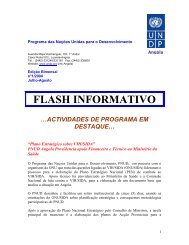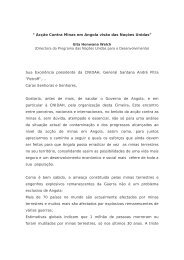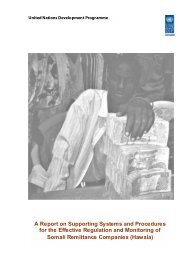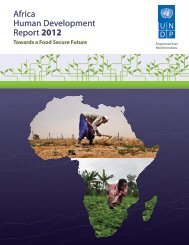CORRUPTION AND ANTI-CORRUPTION STRATEGIES ... - UNDP
CORRUPTION AND ANTI-CORRUPTION STRATEGIES ... - UNDP
CORRUPTION AND ANTI-CORRUPTION STRATEGIES ... - UNDP
Create successful ePaper yourself
Turn your PDF publications into a flip-book with our unique Google optimized e-Paper software.
In general terms, good government is as an<br />
essential precondition for good governance.<br />
Good government is intended to lead toward<br />
a governmental framework accepted by a<br />
participatory public as legitimate, responsive to<br />
the needs of the population and committed to<br />
improving its welfare, competent in providing<br />
law and order and delivering public services,<br />
and providing an effective policy environment<br />
and open-handed in its conduct. Such a system<br />
of government would also want to disengage<br />
itself from direct involvement in other areas,<br />
particularly economic production, to concentrate<br />
its efforts and abilities on societal priorities.<br />
Once political reform is under way and centrally<br />
controlled economies dismantled, this arg u m e n t<br />
suggests, liberal market principles can begin to<br />
promote economic development, which in turn<br />
should promote participation in the political<br />
processes. The long-term economic and political<br />
objectives would thus complement each other<br />
to work toward “an educated population, with<br />
both political knowledge and the will to act,<br />
coupled with a modern industrial economy, a<br />
homogenous society, and a long-established set of<br />
democratic political values” (Riley, 1992, p. 18).<br />
Such conditions would produce an internally<br />
generated, stable and sustainable tax base and a<br />
sizeable economic class outside the political<br />
system whose involvement or participation in<br />
the political and administrative processes would<br />
Corruption and Change<br />
Governments and agencies are increasingly<br />
recognising the “strategic significance that<br />
good government plays in the development<br />
process”, and that good government requires<br />
the “highest standards of integrity, openness<br />
and transparency”, as well as strong criminal<br />
justice systems, 'new forms and dimensions'<br />
of corruption, and its pervasive effect on<br />
government performance, on the use of public<br />
resources, on the general morale in the public<br />
be less for self-gain than a belief in the promotion<br />
of, and the roles of, the state to regulate and<br />
benefit society whose confidence in, and<br />
acceptance of, the legitimacy of the neutrality<br />
and responsiveness of the state would be<br />
confirmed by its efforts on behalf of the<br />
population as a whole, in turn reinforcing<br />
the state's stability and financial viability<br />
(Theobald, 1993).<br />
The new international policy agenda of the late<br />
1990s thus involves a number of assumptions<br />
about corruption and the effective means to<br />
reduce it. Corruption is most obviously defined<br />
as public office, public sector or institutional<br />
corruption. The discussion of the reform of<br />
corruption is almost always conducted in the<br />
context of a 'governance' framework and<br />
involves optimistic expectations of both<br />
economic and political liberalisation. It is also<br />
assumed that public sector corruption will be<br />
reduced if the size of the state is reduced.<br />
Corruption will also be minimised through<br />
general economic liberalisation and through<br />
political liberalisation, that is, moves towards<br />
liberal, pluralist politics, involving a freer<br />
press, competitive party politics, and the<br />
revival or creation of other independent<br />
institutions, reducing corruption by making<br />
it more vulnerable to exposure. In this way,<br />
corruption will have potentially damaging<br />
political consequences.<br />
services and on the legitimacy of the state<br />
and the law (United Nations, 1989). As a<br />
precondition for sustainable reform, moves<br />
toward dealing with corruption have been<br />
emphasised while evidence of so doing is taken<br />
as a key component of a commitment toward<br />
good government.<br />
This reaction to and concern with controlling<br />
corruption is in part a product of events: the<br />
<strong>CORRUPTION</strong>& INTEGRITY IMPROVEMENT INITIATIVES IN DEVELOPING COUNTRIES<br />
4 7







